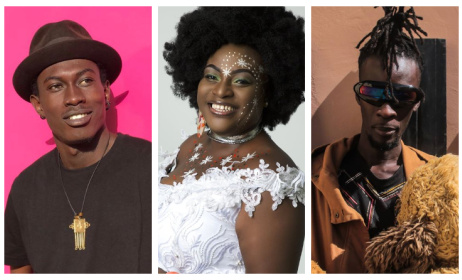What World Music Day means for East African musicians
Fete de la Musique, or World Music Day, is celebrated around the world on 21 June. The annual music celebration was launched in 1981 by former French minister of culture Jack Lang. Today its celebrated in more than 120 countries.
 Ugandan singer Suzan Kerunen (right).
Ugandan singer Suzan Kerunen (right).
The day marks the importance of music and its role in connecting people across borders. It also urges people to play music in public spaces.
Music In Africa spoke to a few East African musicians about the relevance of World Music Day.
"World Music Day for me is a day to recognise musicians who have been able to fuse traditional music with other sounds and create a new sound for people of all ages. Personally, I believe that every day should be World Music Day because every day we experience positive changes that advance our career as artists. On this day, I am most proud of the fact that there are blossoming of platforms around the region, which not only promotes our work but encourages healthy competition." – Suzan Kerunen,Ugandan singer and festival organiser
"World Music Day is the day to celebrate our musical milestones and to show appreciation to our fans and other stakeholders who have supported us over the years. It is also a time to stop for a moment and address issues affecting us as artists because it is the only day that we get the attention of the whole world. On this day, I find even more inspiration in knowing that my work as a female artist is being recognised today and taken seriously as compared to two decades ago when this industry was mostly dominated by men. There are other countless changes within the industry that I'm proud of. The youth, who are the biggest consumers of music, are no longer just supporting the popular bongo flava music but also the sounds rooted to our traditions. This has created job opportunities for musicians fusing different sounds like myself." – Amina Omar, member of Zanzibari traditional group Siti and the Band
"World Music Day to me means celebrating the achievements that Ethiopian artists have made in music around the world. On this day it does not matter whether you are an activist, gospel or secular artist, what matters is that we speak the same language and pass on the same message. It is also very important to know, understand and acknowledge the role that music has played in the liberation of many African countries. Personally, I am grateful for the role the technology has played in propelling my music in reaching a wider audience." – Riyad Sabona, Ethiopian Oromo singer
"As an artist who has once travelled all the way from Nairobi to Kampala, Uganda, to celebrate World Music Day, I know how special it is to have a day dedicated to nothing but music. It creates a platform for music discussions all over the world. Compared to 10 years ago, there is a sudden appreciation of live music in popular night spots. Venues are hiring bands like never before. On this day I would like to request the government and the corporate entities to keep supporting the arts. I would also like to advise musicians to brand themselves well so they can attract corporate endorsements." – Makadem, Kenyan singer and nyatiti player
"World Music Day celebrations in Rwanda should serve as an opportunity for all musicians to come together to exchange ideas and experiences. So every musician should take the opportunity to meet with colleagues and industry players. I feel that I have a reason to celebrate today because Burundian artists are is slowly catching up with other East African countries. A good number of us are collaborating regionally and going on tours across the continent and beyond. However, I would wish to see more women fearlessly dominating the traditional and Afro-fusion genres of music." – Emelance 'Emy' Niwizera, Rwanda-based Burundian singer



























Commentaires
s'identifier or register to post comments